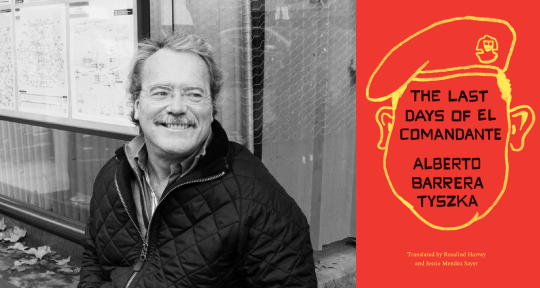The Last Days of El Comandante by Alberto Barrera Tyszka, translated from the Spanish by Rosalind Harvey and Jessie Mendez Sayer, University of Texas Press, 2020
Can a single person hold a country together? Are the mundane pleasantries we all agree to participate in the only things that keep society from devolving into complete chaos? How much control do we really have over even the smallest details of our lives? Written by Hugo Chávez’s biographer Alberto Barrera Tyszka, The Last Days of El Comandante takes the reader back to the final few months of the Venezuelan strongman’s life, a time when Venezuela “was always on the point of exploding but it never did. Or worse: it was exploding in slow motion, little by little, without anyone actually realizing.” These reflections by one of the novel’s main protagonists, Miguel Sanabria (retired doctor turned chair of his apartment building’s residents’ association), introduce the reader to the overwhelming uncertainty that began to engulf the country with Chávez’s mysterious 2011 operation in Havana, Cuba. It merits stating that between ongoing food shortages, contested presidential elections, and accusations of U.S. interference in Venezuelan politics, the instability permeating the novel has an all-too-real corollary in the Venezuela of reality.
With Chávez’s impending demise as a backdrop, the novel thrusts us into the unraveling lives of a number of interconnected characters, despite its relatively short two hundred and forty-eight pages. The variant cast includes: Sanabria and his wife Beatriz, who don’t agree on politics, and his nephew, Vladimir, with whom he is very close; Tatiana, a freelance designer, and her common-law husband Fredy, who receive word that the woman who owns their apartment not only plans on returning to Caracas from Miami, but that she needs them to move out at a time when affordable, secure housing in the city is at a premium well beyond their means; María, a young student, spars with her justifiably fearful single mother, who pulls her out of school and confines her to the apartment because of ongoing violence in the streets; and lastly, U.S. journalist Madeleine Butler who, entranced by Chávez’s larger-than-life persona, flies to Venezuela to write a personal profile on the ailing strongman. Chávez himself, of course, serves as the human event that binds all of these people and their troubles together, even as the country’s decline mirrors the slow deterioration of his own physical state. As things grow worse, the characters spin in and out of each other’s orbit as their daily lives and relationships become harder and harder to maintain. Sanabria gets sucked into the conflict between Tatiana, Fredy, and their landlady, while María, locked in her apartment, begins an online relationship with the couple’s young son over the internet. Every chapter is punctuated with official updates about Chávez’s health, as well as different characters’ responses to those updates, an almost point-counterpoint format that underscores people’s increasing lack of faith in their government and in the world around them. When Miguel Sanabria first informs his wife of Chávez’s illness, for example, she responds by saying, “I wouldn’t be surprised if it was all lies . . . Something the Cubans made up to distract us.” READ MORE…



